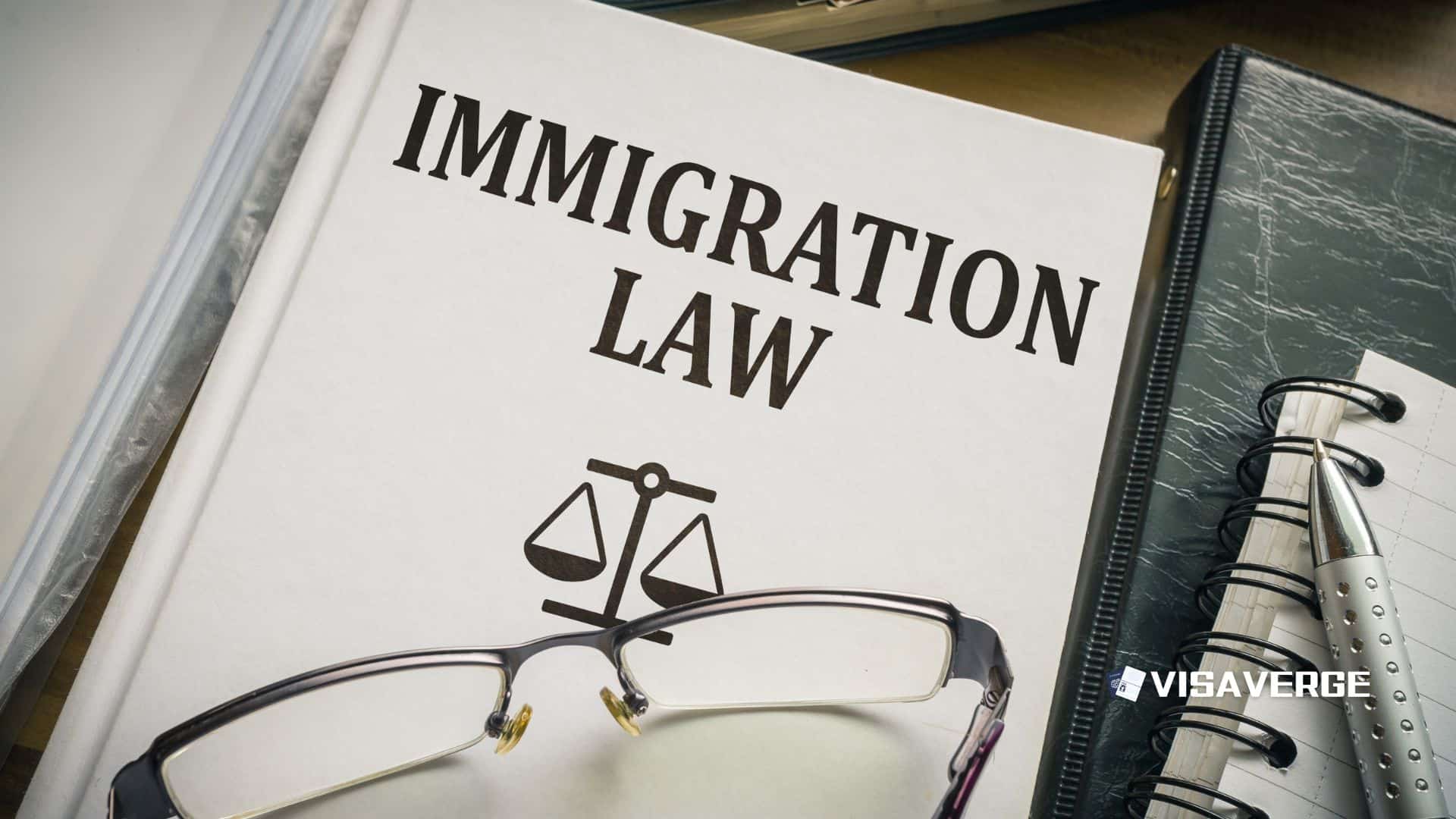Key Takeaways
• On June 26, 2025, the House passed a bill mandating immediate deportation for non-citizens convicted of DUI or DWI.
• The bill applies to all non-citizens, including undocumented immigrants, visa holders, and green card holders, with limited appeal.
• Bill passed House 246-160, now awaiting Senate approval and presidential signature to become law.
On June 26, 2025, the U.S. House of Representatives passed a bill that could change the lives of millions of immigrants in the United States 🇺🇸. The “Jeremy and Angel Seay and Sergeant Brandon Mendoza Protect Our Communities from DUIs Act” aims to make any non-citizen convicted of driving under the influence (DUI) or driving while intoxicated (DWI) subject to immediate deportation. This move has sparked intense debate among lawmakers, legal experts, immigrant advocates, and families across the country.
What Happened: The House Passes a Landmark Bill

The House approved the bill with a bipartisan vote of 246-160. All Republicans supported the bill, and 37 Democrats joined them, showing that concerns about DUI and public safety cross party lines. The bill was introduced by Rep. Barry Moore (R-AL), who said, “If you are a guest in this country and you drive drunk, you should be removed from our country, period.”
The bill is named after Jeremy and Angel Seay and Sergeant Brandon Mendoza, victims of fatal DUI crashes caused by undocumented immigrants. Supporters say the law is needed to protect communities and send a strong message about the dangers of drunk driving.
What the Bill Would Do
If the “Jeremy and Angel Seay and Sergeant Brandon Mendoza Protect Our Communities from DUIs Act” becomes law, it will:
- Mandate immediate deportation of any non-citizen convicted of DUI or DWI, whether the offense is a misdemeanor or felony.
- Apply to all non-citizens, including undocumented immigrants, visa holders, and lawful permanent residents (green card holders).
- Include convictions for driving under the influence of alcohol or drugs, no matter how the offense is classified under federal, state, tribal, or local law.
- Cover those who admit to having committed such offenses, not just those formally convicted.
- Remove most opportunities for legal appeals or discretionary relief—deportation would happen quickly, with little chance to challenge the decision.
As of June 27, 2025, the bill has passed the House but is not yet law. It must still pass the Senate and be signed by President Trump before it takes effect.
How the Law Would Work
If enacted, the process would be straightforward and strict:
- A non-citizen is convicted of DUI/DWI in any U.S. jurisdiction.
- The conviction is reported to immigration authorities.
- The individual is placed in removal proceedings or subject to expedited removal.
- Deportation is carried out quickly, with limited or no opportunity for appeal.
This would be a major change from current law, where DUI is not always a deportable offense unless it is considered an aggravated felony or involves serious injury or death.
Who Would Be Affected?
The bill’s reach is broad. It would affect:
- Undocumented immigrants—those without legal status in the United States 🇺🇸.
- Visa holders—including students, workers, and tourists.
- Lawful permanent residents (green card holders)—even those who have lived in the country for decades.
- Anyone who admits to a DUI/DWI offense, not just those convicted in court.
There is also uncertainty about whether the law would apply to past convictions or only to new offenses. This will depend on the final language of the law and how the Department of Homeland Security (DHS) and Immigration and Customs Enforcement (ICE) decide to enforce it.
Why Is This Happening Now?
Supporters of the bill say it is needed to protect public safety. They point to tragic cases where people lost their lives in crashes caused by drunk drivers who were not U.S. citizens. Rep. Barry Moore, the bill’s sponsor, said, “Today’s vote in the House sends a clear message: if you are a guest in this country, and you break our laws and put American lives at risk by driving under the influence, there will be consequences.”
President Trump is expected to sign the bill if it passes the Senate, as it fits with his administration’s focus on tougher immigration enforcement.
What Do the Numbers Say?
- 246 House members voted for the bill; 160 voted against.
- 37 Democrats supported the bill, including moderates and some progressives.
- DUI is one of the most common criminal convictions that leads to immigration enforcement actions, according to ICE.
- U.S. Customs and Border Protection (CBP) data shows DUI among the top offenses for criminal noncitizen arrests.
What Are the Main Arguments For and Against?
Supporters Say:
- Public safety comes first. Removing non-citizens who drive drunk will prevent future tragedies.
- Deterrence is important. The law will discourage non-citizens from driving under the influence.
- Victims deserve justice. The bill is named after people who lost their lives in DUI crashes caused by undocumented immigrants.
Opponents Say:
- The law is too harsh. It does not distinguish between minor and serious offenses, or consider circumstances like addiction or rehabilitation.
- Due process is at risk. People could be deported quickly, with little chance to appeal or explain their situation.
- Families will be separated. Long-term residents, including green card holders with U.S. citizen children, could be forced to leave the country for a single mistake.
- No evidence that immigrants are more likely to commit DUI. Immigrant advocacy groups argue the law unfairly targets non-citizens.
Legal experts warn that the law could sweep up people with old or minor offenses, and that it removes important legal protections.
How Would This Change Current Law?
Right now, a DUI conviction does not always lead to deportation. Under the Immigration and Nationality Act (INA), only certain crimes—like aggravated felonies or crimes involving moral turpitude—make someone automatically deportable. DUI is not always included, unless it involves serious harm or is part of a pattern of criminal behavior.
The new bill would amend the INA to make any DUI or DWI conviction a deportable offense, no matter how serious the case is or how long ago it happened. There would be no distinction between misdemeanors and felonies, and no consideration for people who have turned their lives around.
For more details on the bill’s text and status, readers can visit the official U.S. Congress bill page.
What Happens Next?
The bill now moves to the Senate, where Republicans hold a majority. Passage is likely, but there could be amendments or delays. If the Senate approves the bill, it will go to President Trump for his signature. If signed, it will become law.
Once enacted, the Department of Homeland Security (DHS) and ICE will issue guidance on how to enforce the law. This will include decisions about whether the law applies to past convictions and how quickly deportations will happen.
Civil rights and immigrant advocacy groups are expected to challenge the law in federal courts, arguing that it is unconstitutional and unfair.
What Should Immigrants Do Now?
Immigrants—especially those who are not U.S. citizens—should be aware that a DUI conviction could soon lead to automatic deportation. This includes green card holders, visa holders, and undocumented immigrants.
If you are facing DUI charges:
- Consult a qualified immigration attorney immediately. The consequences could be severe and permanent.
- Do not plead guilty or admit to a DUI offense without understanding the immigration consequences.
- Stay informed about changes in the law and seek legal help if you have concerns about your status.
According to analysis by VisaVerge.com, the new law would remove most forms of relief or appeal for non-citizens convicted of DUI, making it more important than ever to get legal advice early.
Real-Life Impact: Stories and Scenarios
To understand how the “Jeremy and Angel Seay and Sergeant Brandon Mendoza Protect Our Communities from DUIs Act” could affect people, consider these examples:
- Maria, a green card holder who has lived in the United States 🇺🇸 for 20 years, is convicted of a misdemeanor DUI after a single incident. Under the new law, she could be deported and separated from her U.S. citizen children, with little chance to appeal.
- Ahmed, a student on a visa, is caught driving under the influence of marijuana. Even if it is his first offense and no one is hurt, he could lose his visa and be removed from the country.
- Carlos, an undocumented immigrant, is convicted of DUI. He is placed in expedited removal proceedings and deported within weeks, with no opportunity to explain his circumstances or seek relief.
These scenarios show how the law could affect people from all walks of life, regardless of how long they have lived in the United States 🇺🇸 or their ties to the community.
Key Provisions at a Glance
Here’s a summary of the main points of the proposed law:
| Provision | Details |
|---|---|
| Applies to | All non-citizens (undocumented, visa holders, green card holders) |
| Offenses Covered | DUI/DWI convictions (alcohol or drugs), regardless of misdemeanor/felony classification |
| Deportation Process | Immediate, with limited/no appeal |
| Retroactive Application | Unclear; subject to implementation guidance |
| House Vote | 246-160 (bipartisan support) |
| Next Steps | Senate vote, then presidential signature |
What Are the Broader Implications?
If the bill becomes law, it will be one of the strictest immigration measures targeting DUI offenses in U.S. history. It will:
- Expand the list of deportable offenses to include any DUI or DWI conviction, regardless of severity.
- Remove most legal protections for non-citizens facing deportation for DUI.
- Affect millions of immigrants, including those with legal status and strong ties to the United States 🇺🇸.
- Raise questions about fairness, due process, and proportionality in the immigration system.
Supporters believe the law will make communities safer and prevent future tragedies. Opponents worry it will break up families, punish people unfairly, and do little to improve public safety.
What Official Resources Are Available?
For those seeking more information or legal help:
- U.S. Congress Bill Text and Status: congress.gov/bill/119th-congress/house-bill/875
- U.S. Immigration and Customs Enforcement (ICE): ice.gov
- U.S. Customs and Border Protection (CBP): cbp.gov
- Legal Assistance: Immigrants facing DUI charges should contact a qualified immigration attorney as soon as possible.
Conclusion: What Should Readers Do Now?
The “Jeremy and Angel Seay and Sergeant Brandon Mendoza Protect Our Communities from DUIs Act” is moving quickly through Congress and could soon become law. If it does, any non-citizen convicted of DUI or DWI—no matter their status, circumstances, or how long they have lived in the United States 🇺🇸—will face immediate deportation.
Key takeaways:
- Non-citizens should avoid any behavior that could lead to a DUI conviction.
- If facing DUI charges, seek legal help immediately.
- Stay informed about the law’s progress and be prepared for changes.
As reported by VisaVerge.com, the consequences of this new law could be automatic and irreversible. Immigrants, families, and communities should pay close attention to developments in the Senate and be ready to act if the law is enacted.
For official updates and the latest information, visit the U.S. Congress bill page.
By understanding the details and potential impact of the “Jeremy and Angel Seay and Sergeant Brandon Mendoza Protect Our Communities from DUIs Act,” readers can make informed decisions and protect themselves and their loved ones from the serious consequences of a DUI conviction.
Learn Today
DUI → Driving under the influence of alcohol or drugs, a criminal offense affecting immigration status.
DWI → Driving while intoxicated by alcohol or drugs, similarly punishable under the proposed law.
Immediate Deportation → The prompt removal of a non-citizen from the US following conviction, with little chance for appeals.
Undocumented Immigrant → A person residing in the US without legal immigration status or authorization.
Expedited Removal → A fast removal process where a non-citizen is deported without standard court procedures.
This Article in a Nutshell
The House passed a bipartisan DUI deportation bill targeting all non-citizens convicted of DUI/DWI. Immediate removal with limited appeal raises serious legal and family concerns.
— By VisaVerge.com













